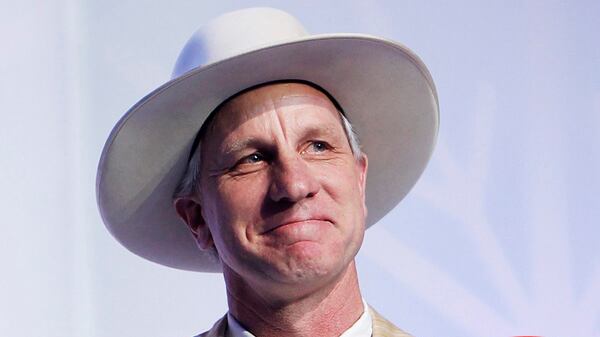Wyoming horseman Buck Brannaman tends to give his charges the gentlest of tugs.
But he seldom loosens the reins on his emotions.
“No, and if I do, about the only thing that’ll kinda aggravate me is if someone’s just being cruel,” he tells me serenely. “Because I just feel so damned sorry for the horse. See, the horse gets stuck with whoever he gets stuck with. He can’t choose who he wants to be around.”
Brannaman, 49, knows cruelty up close and personal. His odyssey from savagely abused child to empathetic adult is at the center of Buck, a heart-rending yet hopeful documentary that opens Friday. His father, a charming confidence man nicknamed Ace, used to thrash him and his older brother, Smokie, without mercy—ostensibly to spur them to success as celebrity trick-ropers and the main source of family income (they had their 15 minutes of fame as “The Sugar Pops Kids” in a nationally televised cereal commercial). But more often than not, the terrible beatings rained down on them for no reason other than sheer inchoate rage.
“Every day was life-threatening. I was faced with death every day,” says Brannaman, who eventually was removed, along with his brother, to a foster home by child-welfare authorities. Their beloved mother, Carol, had died young of diabetes when Buck was 11—pushing their father over the edge. “The first few years after we were taken away from him, he would actually send us birthday cards, and tell us that when we turned 18 that he was going to kill us. He said he’d been watching us through his rifle scope. He wasn’t an alcoholic when I was growing up, just a casual drinker. But he didn’t have to be drunk to just go insane and beat the hell out of you.”
The younger Brannaman, an inspiration for the novel The Horse Whisperer and a technical adviser on the 1998 Robert Redford movie of the same name, speaks not at a gallop but at a leisurely trot. It’s tempting to think of this unhurried Westerner—especially while sitting across from him in Manhattan’s sleek Lamb’s Club—as a country bumpkin in the big city, an innocent among sharpies.
Which would be just fine with Buck.
“You know how people who are so incredibly kind, almost angelic, often get taken advantage of?” he asks, cracking a grin as he mentions a late mentor and real-life horse whisperer named Tom Dorrance. “Tom was such a genius that if you thought you were going to skin him, if you thought you were going to give him a hard time, he was so far ahead of you. And he would have you re-directed and have your mind changed before you had even made a decision to act out in a bad way toward him. And you’d never have known that you had been completely directed by Tom.”
Brannaman recalls that Dorrance once advised him, “ ‘Buck, don’t treat ‘em how they are, treat ‘em how you’d like ‘em to be.’ He never did say if he was talking about people or horses. But I knew he was talking about both.”
Buck, directed with an eye for naturally occurring drama by independent filmmaker Cindy Meehl, tracks Brannaman’s current life as a celebrated horse guru who spends nine months of the year away from his wife and daughters and their 1,000-acre ranch, traveling the country to conduct training clinics for owners and their animals. Buck’s four-day clinics—for which he charges $600 a person—inevitably become group-therapy sessions, with raw feelings frequently manifesting in tears. “Your horse is a mirror to your soul, and sometimes you may not like what you see. Sometimes, you will,” he instructs his students, distilling the movie’s psychically complex themes to two simple sentences.

Buck also tells his personal story of survival against great odds—a narrative Brannaman related in his 2003 autobiography, The Faraway Horses. As the movie makes abundantly clear, he has a gift for equine mind-melding, which lets him communicate almost telepathically with the steeds. He’s a captivating communicator with humans as well.
“I don’t know a lot of facts about my dad because he was a pathological liar,” Brannaman tells me. “He had some of the grandest stories. He told us kids that his great-grandfather had gone West with a wheelbarrow full of leather tools, and he was a saddle maker who had a ranch in Montana. He had a string of lies and he was very intelligent, very convincing, very charismatic—so everybody believed him.”
On a boyhood visit to his dying paternal grandfather in Indiana, Buck grilled the old man and learned that none of Ace’s stories were true. “He refuted 50 things my dad had said to us kids, and when I walked out of my granddad’s bedroom, I looked at my dad and it must’ve shown on my face that I knew my dad was a liar,” he tells me. “And he glared at me, as if to say, ‘If you ever say one word about that, I’ll kill you.’ ”
I ask Brannaman why he didn’t reenact the cycle of abuse with his own family—his wife of 19 years, Mary, their daughter Reata (named for a lasso), and two adult daughters from Mary’s previous marriage.
“I remember when I was 14 years old, I was sitting on a hay stack…and it just dawned on me: ‘I’ve heard people talk, and everybody expects me to not turn out. They think I’m going to be as bad as my dad,’” he tells me. “And I realized even at that age that a kid is capable of manipulation, evoking sympathy from especially the ladies who knew the hell we’d been through and were inclined to feel sorry for me and my brother. And I thought, ‘You know what? If they get to feeling sorry for me, I don’t have to be the same as everybody else; I’m going to get a free pass when I’m not being a good guy and I don’t want it to go that way, I don’t want to end up like my dad.’ That day I made up my mind I wasn’t going to accept being treated any different.”
Buck’s strength of will was pure steel. Among other challenges, he overcame a childhood stutter with scant outside help. “When I was a little guy in grade school, all the kids make fun of you, so I learned how to fight at a pretty early age,” he says, “because I’d get pretty tweaky about someone making fun of my talking. I wasn’t real big, but I was pretty scrappy, and I wasn’t afraid to sucker punch you for laughing at how I spoke.”
He adds: “I think a lot of it had to do with my dad, the terror that I was living in. I was so ashamed that I couldn’t talk…Believe it or not, there would be two or three words that I would remember that I’d had a lot of trouble with during the day, and every night before going to bed, I would say them thousands of times. Just a couple of words. I would say it and say it and say it until finally I would fall asleep. And after a few months, you’d have a couple hundred words, and you can just whip them right out.”
Nowadays, Brannaman feels so comfortable with words that he’s considering a run for public office; at some point, once one of the two incumbents decides to pack it in, he’d like to campaign for Senate as a Republican from Wyoming.
“I’ve got some things I need to do first. I would like to be at the point in my life where I know my family is going to be taken care of, because I make my living with my body and my brain, and I have only so many productive years in me,” he explains. “I still think it can be a noble calling to serve your country. I don’t want to go because I need the job. I don’t really give a damn for one party or another. I just think we need some good people in there.”
It almost sounds as if he’s test-marketing his stump speech. “As soon as someone gets elected, the next week they’re already campaigning for their next election,” he tells me. “So they go up there, sit on their ass and they don’t do anything. Frankly, I think if you do a good job, probably by the end of six years they’re ready to fire you. If you did a good job, they’re ready to run you out of town, and I’ll be just fine. I actually work for a living…I want to be in a position where I don’t need the job—where I’m doing it because I’m trying to do the right thing.”
When he was around 16, Brannaman did just that—reaching out to his estranged father, who by then was a broken man. He credits the “Christian” influence of his foster mother, Betsy Shirley, a woman he clearly adores.
“It kept going through my mind about forgiveness, and I realized that my dad was getting on in age and I didn’t think he’d live much longer, especially the way he’d abused himself,” Buck says. “The drinking never stopped once it got a hold of him when my mom passed away. That was his way of committing suicide.
“I did a little poking around and found out where he was living, and I wrote him a letter: ‘I just want you to know I realize you're getting older. I don’t want you to die thinking that I hate you. You're my dad and because of that there’ll always be a bond between us. I want you to know that I forgive you and I don’t hold any hard feelings. You made mistakes, but those are things you have to live with. But you're my dad and I still love you as my dad.’”
“Frankly," Buck says, "I just wanted to be free of the burden of a pitiful old man dying thinking that his son hated him. Well, he wrote me back and it turned out that he was quite thrilled. I went to see him. He was in Arizona by this time, a little town just north of Prescott. He was on pretty good behavior.”
For all his bad karma, Ace stayed alive for another dozen years.






